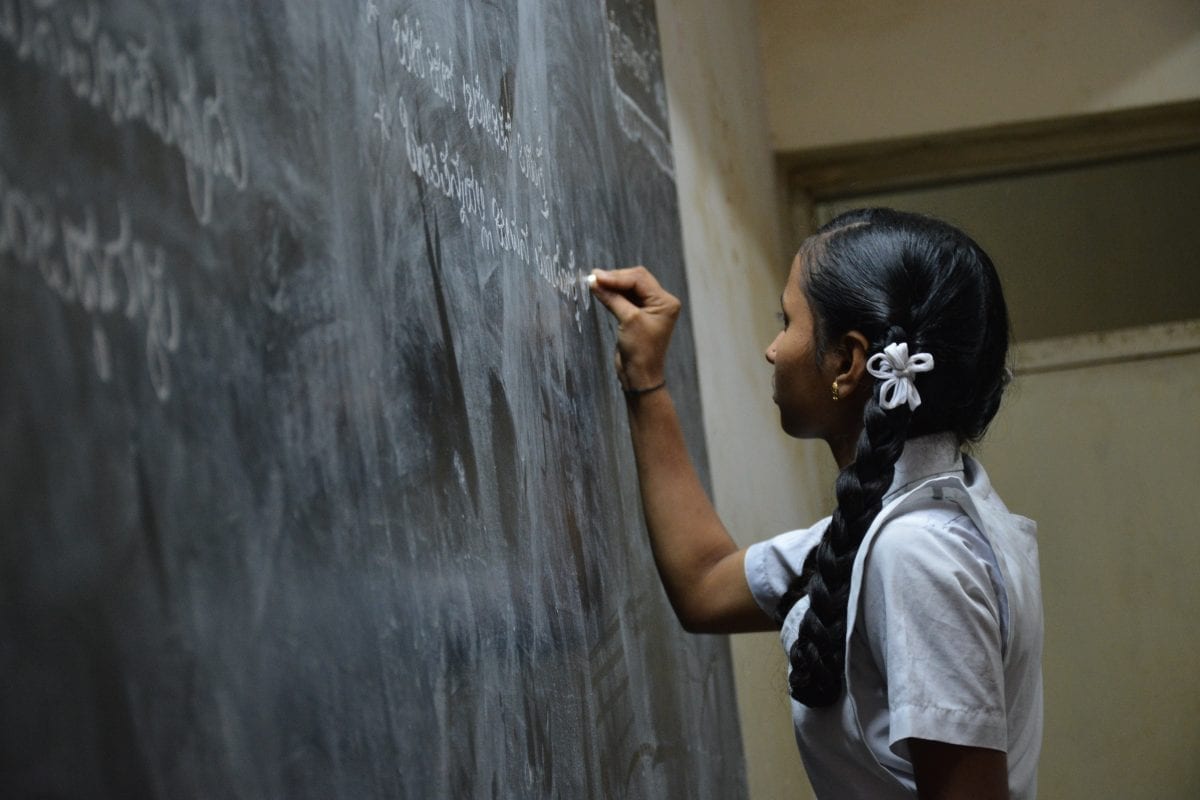It’s shocking but it’s happening. Indian students aren’t learning about proper sex education in school and why that’s a huge problem.
Sex.
Yes, I said it.
Hopefully, the Aunties of the cyber world don’t come for me!
But, in all seriousness, ‘sex’ is basically a bad word in South Asian households that, especially for a young person, who should neither think about nor dare to talk about it. Period.
You’re probably thinking, girl, even in 2020?!
YES!
Even in 2020, the topic of sex continues to be a taboo subject in the South Asian community, particularly in India. The problem is that schools in India perpetuate the harmful stigma surrounding sex by continuing to limit the education on the topic.
For example, according to Feminism India, in Indian schools, the focus is placed on “…teenage pregnancy and HIV/AIDS infection,” rather than prevention. They also note that education around sexuality and “‘menstruation’” is scarce. Lastly, Feminism India reports that there is still a lack of education surrounding “…incorporat[ing] the understanding of [the] difference between the non-sexual and sexual touch.”
For the purpose of this article, we will focus on India. However, I want to provide perspective on the scope of the problem in the South Asian community, as a whole, when it comes to the lack of education on sex. Across the pond in North America, in a survey conducted in 2015, according to NBC News, “…173 Asian-American women 18 to 35 years of age were evaluated. Of that group, 128 reported having sexual intercourse in the past three months. The majority of women (85 percent) reported having received HIV/AIDS education information from school, 41 percent from a doctor or therapist, and only 2 percent received sexual health information from their home.”
Regrettably, these statistics are not surprising within this community.
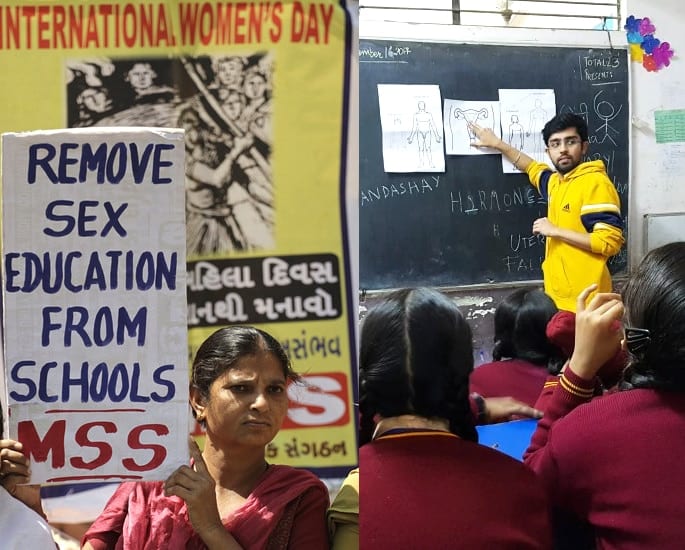
What’s Actually Being Taught in Indian Schools About Sex?
Feminism India describes learning about sex as including “programs offering information on sexuality and contraception. This also encompasses…gender identity, consent and awareness about sexual abuse. It aims to develop awareness around sexual health.”
Unfortunately, this is not what is being taught in Indian schools.
Instead, in Indian schools, sex education is biased. In fact, according to Feminism India, “In 2005, [the] Central Board Secondary Education (CBSE)” launched the “‘The Adolescence Reproductive and Sexual Health Education’ (ASRH project).” The central government released it in 2006. Though it was incorporated by few states, however, they adopted the project with variations according to what they considered to be important.”
Meanwhile, they note that many educational institutions, along with “private and public affiliated state boards of secondary education don’t have any form of sexuality education in their curriculum.’”
In response to the lack of sexual education in schools, Feminism India reported that “The government of India initiated ‘Adolescent Education Program’ (AEP) in 2007 in collaboration with National AIDS Control Organization (NACO) and United Nations Children’s Fund (UNICEF).” While the initiative was well-intended and has hopes of educating young minds about topics including “…body image, violence and abuse, gender and sexuality and STIs, substance abuse, especially drugs and other unhealthy attitudes, the notion of ‘consent’ and ‘attraction.’” However, not only was the initiative unsuccessfully launched in schools, but it was also “banned by 12 Indian state governments as the program’s content was considered to be ‘inappropriate’” explains Feminism India.
As illustrated by the limited or lack of education about sex in Indian schools, it is evident that the South Asian community is not ready to change their stance on this subject matter.
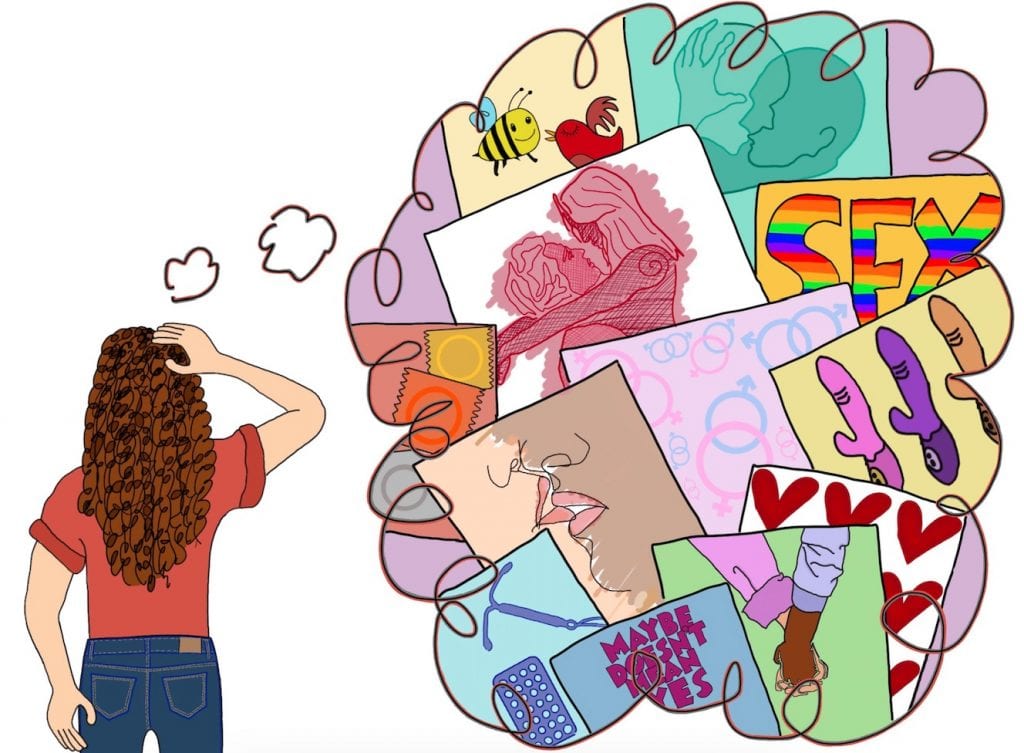
The Dark Side of Not Learning About Sex for Young People:
Sex, despite what South Asian culture has taught many women, in particular, is not just about procuring a child. Instead, it represents a form of intimacy and a way to express yourself with a partner of your choice, safely.
However, when a child is not made to understand what sex is and is not, what practicing safe sex entails, or what sexual abuse is, they are less likely to recognize when they are in a negative situation.
A recent survey by the Indian Ministry of Women and Children Development and carried out in collaboration with UNICEF and Prayas a Pune-based NGO that focuses on “health, energy, learning and parenthood” they interviewed 12,247 children and 2324 young adults in 13 Indian states. They found that a shocking 53% of children between the ages of 5 and 12 have been sexually abused. Most often, perpetrated by parents, legal guardians or close members of the family. Where “more than half of all these cases of sexual abuse and rape go unreported.
Even worse, the violence continues beyond their formal childhood years for many women. For instance, according to The Diplomat, “…more than two-thirds of married women in India, between the ages of 15 to 49 have been beaten, raped, or forced to provide sex.”
But, as unfortunate as it is to say, when the law legalizes this type of behaviour, change is difficult to bring about. For example, according to The Diplomat “Section 375 of the Indian Penal Code (IPC) defines rape as a criminal offense and states that a man commits rape if he has sexual intercourse with a woman without her consent or if she is a minor. However, according to exception 2 to Section 375 “sexual intercourse by a man with his own wife, the wife not being under fifteen years of age, is not rape.”
While is it not the only contributing factor, the lack of education is dangerous and works to perpetuate the chilling rape culture that is notorious in India.
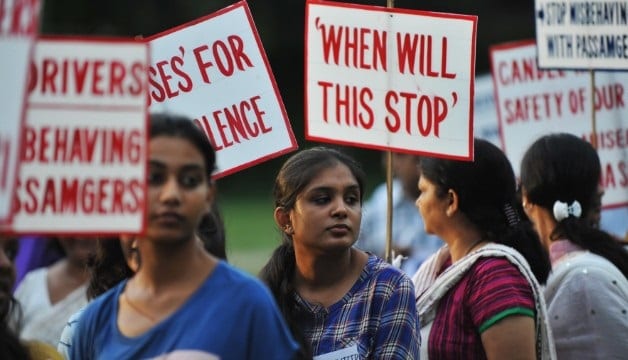
What Needs to Change?
While the lack of education about sex is normalized in South Asian culture and the Indian education system, it is a problem that is impacting young people.
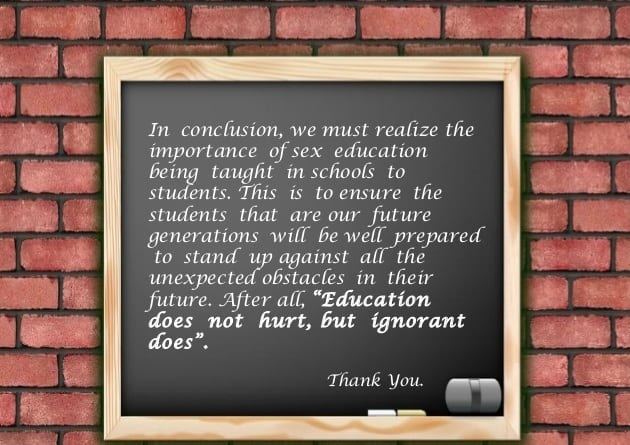
The dialogue, as uncomfortable as it might be, needs to be pried open. If households are not willing to do so, then sexual education programs in school need to do the right thing and make more of an effort to educate young men and women about what is and is not acceptable when it comes to sex. This includes, according to The Economic Times, teaching young men about how to treat women, insofar “…that it’s wrong to talk disparagingly about women, feel up girls surreptitiously, make lewd remarks and leer at them.” Meanwhile they also note that young women need to be taught that it is normal to stand up for themselves if or when they face any unwanted sexual advances or other forms of assault.
I know it will be a turbulent road, but it is necessary to push for unbiased and holistic sexual education in Indian schools.
The rape culture that is prominent in India needs to be dismantled and it starts with education, so that future generations are aware that what may have happened to them was not acceptable. The hope is this education will help to break the cycle and protect young children in the years to come.
That said, it is 2020, so to hell with the judgement of all the Aunties and what is acceptable in South Asian culture. In my humble opinion, if it is going to protect future generations, I say, let’s talk about sex, baby!
Main Image Photo Credit: Nikhita S/Unsplash.com
Devika Goberdhan | Features Editor - Fashion
Author
Devika (@goberdhan.devika) is an MA graduate who specialized in Political Science at York University. Her passion and research throughout her graduate studies pushed her to learn about and unpack hot button issues. Thus, since starting at ANOKHI in 2016, she has written extensively about many challe...


















































